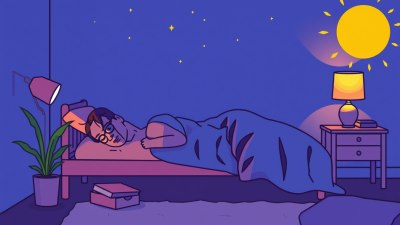How to Sleep When It's Too Hot to Think
Discover effective strategies to sleep better when the heat keeps you awake. Tips and tricks to stay cool and restful on hot nights.

Facing hot nights that disrupt your sleep can be a frustrating and exhausting experience. When temperatures soar, falling asleep or staying asleep becomes a challenge for many. Our bodies rely on a slight drop in core temperature to enter restful sleep, but extreme heat can interfere with this natural process, leading to discomfort and restlessness. However, there are practical and science-backed methods to help you sleep better even when it's too hot to think.
Understand How Heat Affects Sleep
The human body temperature and sleep cycles are closely linked. Normally, your body temperature lowers in the evening, signaling that it's time to rest. This cooling process helps initiate sleep onset and improves sleep quality. When ambient temperatures are high, your body struggles to dissipate heat, which can delay sleep onset and reduce overall sleep efficiency. Studies have shown that sleeping in environments above 75°F (24°C) can start to negatively impact sleep quality significantly.
Create a Cool Sleeping Environment
One of the most straightforward ways to combat nighttime heat is by optimizing your bedroom environment. Here are several actionable tips:
Use Fans Wisely: Fans help circulate air and can increase evaporation of sweat on your skin, which cools you down. Position a fan to blow air across your body or near an open window. For added effect, place a bowl of ice or a frozen water bottle in front of the fan to circulate cooler air.
Leverage Air Conditioning: If you have air conditioning, set it to a comfortable temperature between 65°F and 70°F (18°C-21°C). Make sure to maintain your AC system properly to ensure efficiency. If you don’t have AC, consider other cooling appliances or portable air cooling units for your bedroom.
Choose Breathable Bedding: Opt for cotton, linen, or moisture-wicking sheets and pillowcases. Synthetic fabrics tend to trap heat and perspiration, making you feel hotter at night. Also, avoid heavy comforters—choose lightweight blankets or a thin sheet instead.
Optimize Your Sleeping Position and Clothing
Sleeping position and attire influence your body heat regulation. Wearing loose, lightweight, and breathable cotton pajamas can help wick moisture away and improve airflow. Some people prefer sleeping with minimal or no clothing to enhance heat dissipation.
The sleeping position itself also matters. Spreading your body out increases surface area exposure and can aid in heat release; avoid curling up tightly which traps heat close.
Cool Your Body Before Bed
Preparing your body for sleep during hot weather can improve comfort and speed up sleep onset. A few effective strategies include:
Take a Lukewarm Shower: Cooling your skin before bed can help lower your core temperature. Avoid very cold water as it may cause your body to react by constricting blood vessels, which retains heat. Lukewarm or slightly cool water works best.
Use a Cooling Towel or Ice Packs: Applying a damp, cold towel or reusable ice pack to pulse points—like wrists, neck, forehead, or behind knees—helps cool you down quickly.
Hydrate Strategically: Drink a glass of cold water before bed to help regulate your internal temperature. Avoid excessive water intake that might wake you up for bathroom trips.
Control Your Sleep Schedule and Habits
Consistent sleep patterns and routines help your body maintain its circadian rhythm, which can still function even in tough conditions. Try to keep a regular bedtime and pre-sleep routine, even during hot weather.
Avoid heavy meals, caffeine, and alcohol before bed, as they can exacerbate heat discomfort and disturb sleep quality. Eating late at night increases metabolism and body heat. Opt for light, cooling foods like fruits and vegetables.
Utilize Cooling Technologies and Products
Advancements in sleep technology provide tools specifically designed to combat heat. Some popular options include:
Cooling Mattress Toppers: Gel-infused memory foam or breathable toppers help dissipate body heat and maintain a cooler sleep surface.
Temperature-Regulating Pillows: Pillows with breathable fill materials or cooling gel layers reduce heat buildup around your head and neck.
Bed Cooling Systems: More high-end solutions circulate cool water or air through a mattress pad, creating an ideal sleeping temperature.
Adjust Your Room Setup for Natural Cooling
Harnessing natural airflow and shade can make a big difference. During the day, keep curtains or blinds closed to block direct sunlight, preventing your room from heating up prematurely. Cross-ventilation is helpful; open windows selectively to create a flow that cools your room effectively without letting in warm air.
Mind Your Mental State
Heat intolerance during sleep can increase stress and frustration. Practicing relaxation techniques such as deep breathing, progressive muscle relaxation, or meditation can help calm your mind, lower heart rate, and improve your ability to fall asleep despite discomfort.
Consider Adjusting Your Room Humidity
Humidity plays a crucial role in heat perception. High humidity makes it harder for sweat to evaporate and cool your body. Using a dehumidifier can reduce indoor humidity levels, making heat feel less oppressive. Optimal indoor humidity levels for comfort are between 40% and 60%.
Alternative Cooling Methods
Some additional creative methods may help improve your comfort:
Sleep Low: Heat rises, so consider sleeping on the floor or lower surfaces if safely possible. This can expose you to cooler air.
Elevate Your Feet: Elevating feet slightly sometimes aids circulation and heat dissipation.
Cool Your Bedtime Drink: A small glass of cucumber-infused cold water or herbal iced tea can refresh you before bed.
When Heat-Related Sleep Issues Become Serious
Persistent insomnia caused by heat can have significant health impacts including daytime fatigue, mood disturbances, and impaired cognitive function. If you live in an area with consistently high temperatures, consider long-term adjustments such as investing in reliable air conditioning, blackout curtains, or even sleeping elsewhere temporarily.
Also, be aware of heat exhaustion and heatstroke symptoms. If you wake feeling confused, dizzy, or excessively thirsty, seek medical attention promptly.
Sleeping during hot weather is challenging but manageable with the right strategies. By optimizing your bedroom environment, adjusting clothing and bedding choices, cooling your body before bed, maintaining hydration, controlling humidity, and using modern cooling products, you can improve your comfort and sleep quality on scorching nights. Consistency and mindfulness about your environment and body signals remain key to overcoming heat-related sleep difficulties.
Experiment with a combination of techniques—fans, breathable materials, cooling showers—and pay attention to what works best for you. Remember, quality sleep is crucial for your health and well-being, especially when facing environmental stressors like extreme heat.











